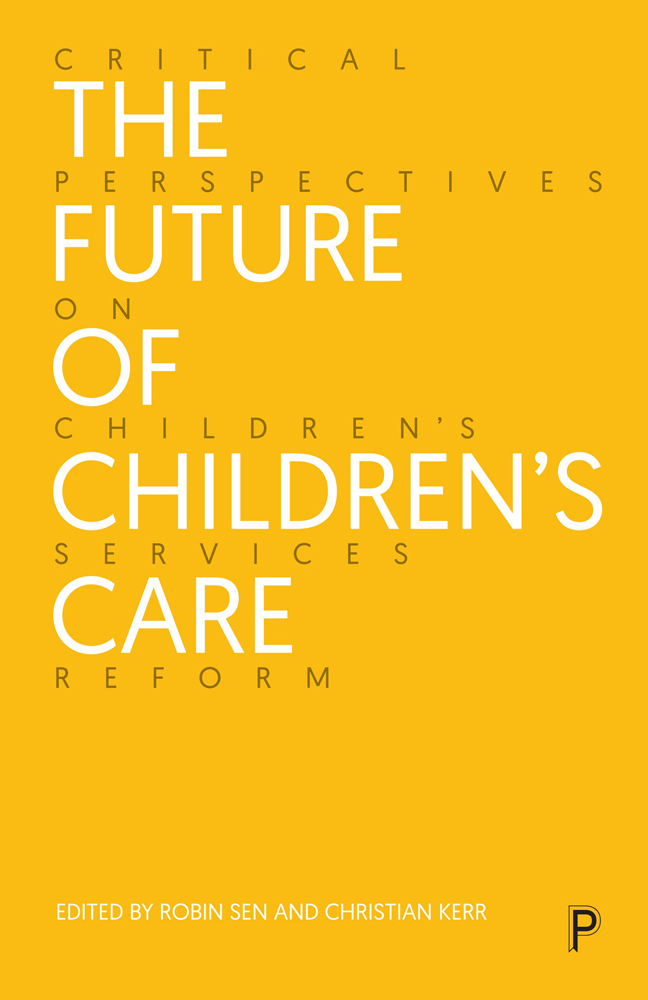Book contents
- Frontmatter
- Dedication
- Contents
- Notes on contributors
- Acknowledgements
- Foreword
- 1 Introduction: critical perspectives on children’s services reform
- 2 Where now? Children's rights in England into the 2020s
- 3 More of memes than schemes: networked propagation in children's social care
- 4 Reclaiming social work, the social work complex and issues of bias in children's services
- 5 Humane social work practice: a more parent friendly system? Hopes and challenges in the 2020s
- 6 Exploring and re-imagining children's services in England through a decolonial frame
- 7 Kinship care for England and Wales in the 2020s: assumptions, challenges and opportunities
- 8 If adoption is the answer, what was the question?
- 9 Caring for children and young people in state care in the 2020s
- 10 Protecting children: a social model for the 2020s
- 11 Conclusion: children's services reform looking back and forwards
- Index
9 - Caring for children and young people in state care in the 2020s
Published online by Cambridge University Press: 23 January 2024
- Frontmatter
- Dedication
- Contents
- Notes on contributors
- Acknowledgements
- Foreword
- 1 Introduction: critical perspectives on children’s services reform
- 2 Where now? Children's rights in England into the 2020s
- 3 More of memes than schemes: networked propagation in children's social care
- 4 Reclaiming social work, the social work complex and issues of bias in children's services
- 5 Humane social work practice: a more parent friendly system? Hopes and challenges in the 2020s
- 6 Exploring and re-imagining children's services in England through a decolonial frame
- 7 Kinship care for England and Wales in the 2020s: assumptions, challenges and opportunities
- 8 If adoption is the answer, what was the question?
- 9 Caring for children and young people in state care in the 2020s
- 10 Protecting children: a social model for the 2020s
- 11 Conclusion: children's services reform looking back and forwards
- Index
Summary
Introduction
It would be remiss not to comment on personal experience – although this was all over 30 years ago – which included a few foster homes, a children's home, kinship care and, through adolescence, a local authority boarding school for children with emotional and behavioural difficulties. The relationship between these experiences and my current ideas about the care system is peripheral, consciously at least, and I am much more influenced by the experiences I have had, and witnessed, over nearly two decades working in the care system. That said, to be care-experienced gives any discussion about the care system an emotional resonance that is bound to affect thinking.
Much of my career, and therefore day-to-day involvement with children in care, has been spent working in residential children's homes – for the most part as a care worker, often in senior/team leader roles, a brief period as a registered manager, developing staff training and so on. The nature of the role of children's homes within the care system (the de facto ‘last resort’) means a significant majority of the children and young people I have been involved in caring for have had multiple foster homes, and sometimes a number of children's homes too, before I knew them. Many, of course, went on to have other homes when my part in their lives ended. I have witnessed many ‘placement breakdowns’ – to use the rather cold jargon. Similarly, I have seen numerous young people leave care, but rarely to a situation or accommodation that I considered good enough. In short, the vast majority of children I have been involved with have not only had to contend with the very difficult experiences, sometimes horrific, that led to them coming into care, but they have been manifestly let down by the care system too.
More recently, my contact with children in care has been with those I see as a therapist and I have been involved, at one remove, with children in foster care who have experienced developmental trauma and disrupted attachment in a role supporting carers to think about the experiences and needs of their foster children. I have had no involvement in my career with children who are very settled where they are living and quietly getting on with their lives with no particular difficulties.
- Type
- Chapter
- Information
- The Future of Children's CareCritical Perspectives on Children's Services Reform, pp. 161 - 177Publisher: Bristol University PressPrint publication year: 2023



